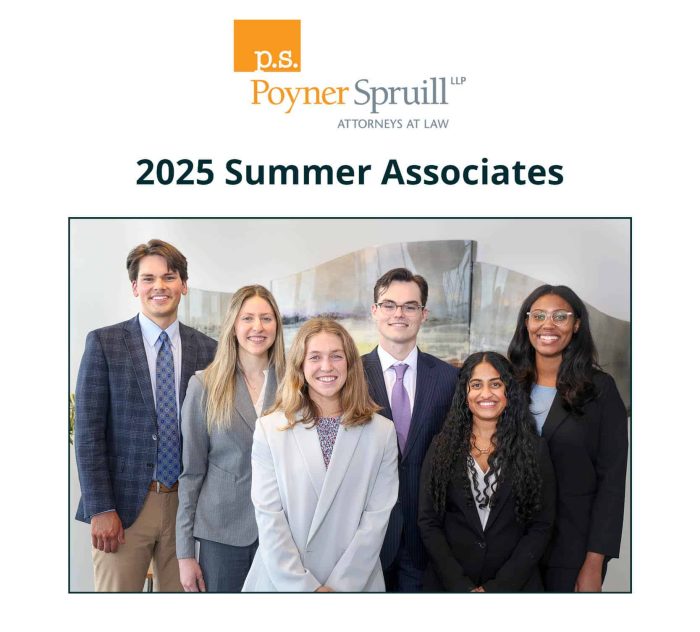RALEIGH, N.C. — 21 states filed an amicus brief on Friday urging the U.S. Supreme Court to grant a certiorari petition that Poyner Spruill filed last month on behalf of Trout Unlimited and California Trout, two well-known conservation groups. The certiorari petition asks the Supreme Court to review a D.C. Circuit decision about when and how states lose their Clean Water Act authority to ensure that federally licensed projects comply with water-quality requirements—a decision that deepened a conflict among the federal appellate courts, and one that has significant implications for states and the environment.
Poyner Spruill lawyers Drew Erteschik, Saad Gul, J.M. Durnovich, Colin McGrath, and Cosmo Zinkow represent Trout Unlimited and California Trout before the Supreme Court.
“We’re pleased to see such a strong showing of support from the states at the petition stage,” said Durnovich. “Petition-stage amicus support from even one state is notable, and here, 21 states are urging the Court to grant cert.”
Erteschik, lead appellate counsel for the petitioners, noted the geographic and political diversity of the supporting states. “The states supporting our petition have a wide array of environmental policies and concerns, which are as diverse as one might imagine—for example, those of Hawaii versus those of Mississippi,” said Erteschik. “This unified and significant level of state amicus participation only confirms that the case has enormous implications for the states’ role in ensuring the quality of our nation’s waters.”
The case arises in the context of a federal hydropower project along the Klamath River, which runs through California and Oregon. The project would remove four hydroelectric dams, reconnecting more than 400 miles of salmon and steelhead habitat that the dams currently block. The federal government licenses projects like these, which affect the nation’s waters, but the role of ensuring that these projects comply with water-quality requirements is reserved for the states.
Under the Clean Water Act, applicants for these projects must request and obtain a certification from the affected states that any discharges into the water will comply with federal and state water-quality requirements. States must act within one year of a request, or under section 401 of the Clean Water Act, they waive their authority to certify the applicant’s compliance with water-quality requirements.
In complex cases, however, applicants and states require more than a year to develop the record that states need to make a decision. Thus, applicants often withdraw and resubmit their request before the one-year period expires to avoid forcing the state to decide the request prematurely. In the decision below, however, the D.C. Circuit held that when applicants take this approach, it results in a waiver of the states’ Clean Water Act authority.
If a state is deemed to have waived its section 401 authority, the federal licensing continues without any certification whatsoever from the state that a project will satisfy federal or state water-quality requirements. Because many federal projects are licensed for fifty years at a time, and some projects receive permanent licenses, a waiver of state authority means that a project could operate in a manner that harms water quality for generations.
About the Attorneys
Drew Erteschik focuses on high-stakes litigation and appeals. Clients trust him to take the lead on their most significant matters, especially those with challenging or novel legal issues. Chambers USA: America’s Leading Lawyers for Business has profiled his “highly acclaimed practice,” and Benchmark Litigation has named him a “state litigation star.” He is a board-certified specialist in appellate practice, and currently serves as the chair of the North Carolina Bar Association’s Appellate Rules Committee and co-chair of the American Bar Association’s Judicial Division Amicus Committee.
Saad Gul co-chairs the firm’s privacy and cybersecurity team, while also maintaining an active appellate and regulatory litigation practice. Before law school, he clerked for Chief Judge John C. Martin of the North Carolina Court of Appeals and Justice Patricia Timmons-Goodson of the North Carolina Supreme Court. He came to Poyner Spruill after working for two major Washington, D.C., law firms.
John Michael (J.M.) Durnovich represents individuals, businesses, and government bodies facing a wide range of challenges, with a concentration in high-stakes governmental disputes, whistleblower claims, constitutional litigation, and business disputes. In addition, he regularly represents clients through appeals at all levels of state and federal courts, including at the U.S. Supreme Court.
Colin R. McGrath represents land owners, developers, and local governments in state and federal court on a myriad of land use, zoning and real estate issues. He also devotes a substantial part of his practice to complex civil litigation, including government-related disputes. Before joining the firm, he clerked for Judge Gregory P. McGuire of the North Carolina Business Court.
Cosmo Zinkow is a member of the firm’s litigation section. He represents businesses, government entities, and individuals in a wide range of civil lawsuits and appeals. In 2019, he was part of the appellate team that successfully petitioned the U.S. Supreme Court for a writ of certiorari.



